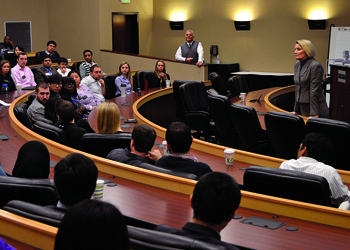Blazing a Trail
In the world of supply chain management, the trailblazers were Michigan State University’s Eli Broad College of Business faculty.
March 7, 2014
How MSU faculty and donors created the nation’s premier program in supply chain management...
In all great accomplishments and discoveries, someone must be the first to veer off the established route and strike out in a bold, new direction.
In the world of supply chain management, the trailblazers were Michigan State University’s Eli Broad College of Business faculty. They created one of the first programs in teaching and research and laid the groundwork that propelled MSU’s supply chain management program to #1 in the U.S. News and World Report rankings since 2012.
Alumni support helped build the necessary momentum, establishing three endowed chair positions in MSU’s Department of Supply Chain Management at critical junctures.
But the trailblazing is far from over. The department’s leadership in opening the Midland Research Institute for Value Chain Creation is a new success marker along MSU’s more than 60-year journey in supply chain. In short, MSU’s early leadership has become a driving force that is revitalizing business in Michigan and influencing how supply chain is practiced and taught worldwide.
Finding the right path
Trailblazers must navigate uncharted territory and as the founding faculty took their first steps to shape an emerging discipline, they must have felt like true pioneers. Back in the 1950s, traditional management functions didn’t focus on processes outside of a company’s four walls. Even the term “supply chain” was yet to take hold, says David Closs, the John H. McConnell Chair and department chairperson.
MSU’s first leaders included Don Bowersox in logistics along with John Hoagland and Robert Monczka in purchasing. Professor—later Dean—Bowersox was informally known as the “grandfather of logistics,” co-authoring the original text in that field. Professors Hoagland and Monczka supplied a commanding expertise in purchasing, something that was an unheard of academic specialization at the time. They recruited many colleagues to complete their unique vision of a supply chain platform balanced upon the three pillars of logistics, purchasing and operations. They believed supply chain covered everything from product development, sourcing, production, marketing and logistics, as well as the information systems needed to synchronize these activities. Few in business and industry were trying to understand these functions comprehensively.
Even fewer colleges of business had the foresight or the cooperative spirit for the cross-disciplinary collaboration it took to study such an approach.
Today, most firms employ teams that synergistically manage supply chain processes to achieve a competitive advantage. Thanks in part to MSU’s leadership, it is well understood that value can be gained from integrating internal and external processes from raw materials to delivered products and now, even beyond, to incorporate sustainability practices such as recycling.
What was once a road less traveled, is now a busy super highway.
A new horizon for others to follow
Many other top universities have joined MSU in offering supply chain management programs at the undergraduate and graduate levels. But MSU remains a world leader in scope and balance, says Closs, who earned his Ph.D. in the department. He is also a leading author and presenter of world-class logistics and supply chain capabilities and applications and took part in a 2012 White House supply chain panel on sustainability.
“Our perspective is very broad as we consider the supply chain system from end to end, and at the same time keeping all the functions in balance. We train our students to have a broad, highly integrated approach,” he says.
This has placed MSU supply chain graduates in great demand in business and industry as well as in higher education. The 2012 graduating class boasted a 95 percent placement rate.
Closs says the department’s reputation is often summed up this way: “If you came from MSU supply chain you never get questioned; if you are not from MSU supply chain you never have the answers.”
Alumni support maps the future
Just one year into MSU’s visionary venture, another Spartan trailblazer, alumnus John H. McConnell (’49, Business) borrowed $600 to found Worthington Industries, Inc., his own experiment in supply chain management. Worthington grew into a multi-billion dollar and multi-national company. John, who passed in 2008, established the first endowed professorship to support supply chain, first held by Bowersox and now by Closs. John’s example led the way for other alumni to invest in the Broad Business College.
Both Bowersox and Hoagland are deceased, but their legacy is ever present in the supply chain program, in large part due to support from their former students.
In 2004, Richard Metzler (’63, Business) joined with John Hoagland to create the Hoagland-Metzler Endowed Chair in Purchasing and Supply Management. It was Metzler’s desire to honor his former advisor and professor and facilitate the attraction of outstanding faculty in the sourcing discipline. Joseph Sandor who is a national leader in procurement strategies holds the position. He joined the MSU faculty with over 25 years of supply management experience in a wide range of prominent companies including Sara Lee, General Motors and Beatrice. He was also an adjunct professor at the University of Chicago’s Graduate School of Business.
Hoagland and Metzler also provided the seed gift to establish the Supply Chain Management Endowed Scholarship/Fellowship Fund to support Broad graduate students interested in purchasing.
Rob Thull (’73, Business), founder and chief executive officer of Milestone Equipment Holdings, LLC of California, recently made a $1 million gift to complete funding for a Bowersox endowed chair position, which was previously supported through gifts from multiple alumni, colleagues and friends of Bowersox.
Patricia Daugherty became the first holder of the Bowersox-Thull Chair in Logistics and Supply Chain Management in 2012. She was once a Bowersox student herself, obtaining her Ph.D. from MSU in 1988. Prior to her return to Michigan State, she was the director and Siegfried Chair in Marketing and Supply Chain Management at the University of Oklahoma.
Staying out in front
One area where MSU is not in the supply chain forefront is its number of endowed chair and professorship positions. Other major academic programs in supply chain have more than thirty percent named positions to MSU’s fifteen percent—a deficit that puts the department at risk for losing senior faculty.
“If an institution starts a program in supply chain, they will often look to MSU to fill the senior position,” says Closs, “so our faculty are often targeted for recruitment.”
MSU’s historical leadership in supply chain, coupled with support from alumni, has created a program many other institutions hope to emulate. The strength of MSU’s program is helping business and industry in Michigan and the world.
But this program has never rested on its laurels.
The challenge now is to invest in this premier program so that resources and expertise can be marshalled to discover and boldly go in the next new direction.
For more information on making a gift to the Eli and Edythe Broad College of Business, contact Senior Director of Development Vivian Leung at leungv@msu.edu or by calling (517) 355-8504.
Supply chain delivers the value: MSU launches value chain research institute in Midland
Michigan State University announced plans to open a new research institute in Midland, Michigan, focusing on value chain creation and management and tackling many of today’s grand challenges in business, says MSU President Lou Anna K. Simon.
“Whether you’re talking about simply delivering safe water locally or fostering international competitiveness, effective value chain creation is key,” she says. “By developing more effective, sustainable value chains through this initiative, we hope to provide both an advantage for American manufacturing and pathways for the world to respond more successfully to human needs. In addition, we will cooperate with the Midland community in creating new knowledge and training opportunities, to help the region prosper in the new global economy.”
Value chain refers to the effective management of processes related to product innovation, design, sourcing, procurement, manufacturing, packaging, transportation, inventory management, warehousing, marketing, customer services, and returns and repairs.
Through the new Midland Research Institute for Value Chain Creation, MSU will conduct research as well as offer graduate studies in value chain management. The institute also will offer non-degree courses and certificate programs onsite and online.
Initially, an executive director and six tenure-track MSU researchers will staff the institute; the location will be announced soon. Taking an interdisciplinary approach, MSU faculty from the Broad College of Business, the College of Engineering, the College of Agriculture and Natural Resources and the College of Social Science will be involved in the research.
David Closs, the John H. McConnell chaired professor and chairperson of MSU’s supply chain management department, will serve as interim director during the executive director search. MSU’s supply chain management undergraduate program is ranked as the best in the nation, while the graduate program holds the No. 2 ranking, according to U.S. News and World Report.
Institute researchers will work with undergraduate and graduate students, postdoctoral researchers and corporate collaborators to develop and apply new knowledge, with the aim of improving all types of public and private value chains.
The institute, launched with a total of $15.5 million in philanthropic and corporate support pledges, will focus on three research areas:
• Novel, evidence-based tools for value chain management
• Quantitative assessment, monitoring and management of integrated supply chain solutions
• Food- and water-focused research projects, including humanitarian efforts
Simon cited Midland’s and the Great Lakes Bay Region’s existing corporate value chain talent pool and MSU’s robust, century-old relationship with the region as reasons for establishing the facility in the central Michigan area.
The Dow Chemical Company, Dow Corning Corporation, The Herbert H. & Grace A. Dow Foundation and The Rollin M. Gerstacker Foundation will be the initial donors to the institute, with others recruited over time.
“Having the MSU Midland Institute in the region will facilitate advancements in sustainable value chain management including packaging technology, as well as provide valuable professional educational opportunities,” says Dave Kepler, executive vice president, Business Services and Chief Sustainability Officer, Chief Information Officer at the Dow Chemical Company. “We see the institute as having wide-ranging benefits for businesses and their employees across the region, in terms of economic development, career development, attracting and retaining top talent and positively impacting the overall quality of life in the region. Dow is committed to helping MSU succeed in this endeavor.”
“The creation of a strategic, world-renowned supply chain research facility in Midland will help strengthen the United States’ competitive advantage in today’s rapidly changing global marketplace,” says Bob Hansen, president and CEO, Dow Corning Corporation. “Additionally, the institute will contribute to the economic vitality of the Midland community, which Dow Corning has called home for the last 70 years.”




